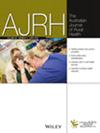Factors Positively Influencing GP Obstetricians to Remain in Rural and Remote Obstetric Practice
Abstract
Objective
To explore factors that enable and encourage GP Obstetricians (GPOs) to remain in their role providing perinatal care and delivery services in rural and remote locations.
Setting
Rural and remote locations in North and Far North Queensland.
Participants
Participants were GPOs providing maternity care and delivery services. They were invited to be interviewed for the study via hospital email and snowballing.
Design
We conducted 11 semi-structured interviews with GPOs from July to August 2023. Interview data were coded and analysed using thematic analysis into themes and subthemes.
Results
We identified two overarching themes as enablers: job satisfaction and support. Job satisfaction was composed of enjoyment arising from an interest in the field and procedural work, and feelings of fulfilment deriving from serving the community. Support centred around constant, supportive interactions with midwifery and medical colleagues in the workplace, medical colleges, and staff at regional referral centres.
Conclusion
As GPOs who remain in rural and remote areas identify support as a key enabler, establishing strategies to improve service delivery and retention involves expanding and supporting the current system as well as implementing new approaches to support practitioners both at work and home. Skill maintenance should be tailored toward individual needs, referral centres need to have a fostering and inclusive mindset toward their rural practitioners, review systems should be inquisitive and constructive rather than punitive, and colleges should foster and support their fellows.

 求助内容:
求助内容: 应助结果提醒方式:
应助结果提醒方式:


